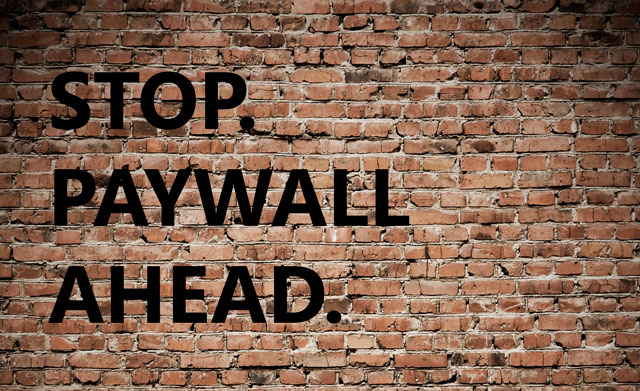 Chances are, if you’re on a mailing list connected to the media industry, you would have received numerous (digital) links to studies and reports hailing the success of paywalls by various publishers around the world. And in light of the spectacular failure of digital publishing to offer a sustainable business model in its first 20 years of existence, more and more media houses are pinning their salvation on paywalls. I believe this could be the most foolish act of all.
Chances are, if you’re on a mailing list connected to the media industry, you would have received numerous (digital) links to studies and reports hailing the success of paywalls by various publishers around the world. And in light of the spectacular failure of digital publishing to offer a sustainable business model in its first 20 years of existence, more and more media houses are pinning their salvation on paywalls. I believe this could be the most foolish act of all.
In early June, I was fortunate enough to attend the World Newspaper Conference, where the illuminati of news publishers gathered in the hustle and bustle of temple-laden Bangkok. It was a cherry-popping exercise for me, not only being a relative newcomer to the media industry, but also representing one of few, if any other, digital-only publishers at the conference. And as a newbie, a couple of notions really hit home about the state of newspaper publishing.
The first was my amazement at the proliferation of grey hair and grey suits, both on stage and in attendance. Dressing up for digital media conferences in South Africa usually means dusting out the only collared shirt in your possession and perhaps even tying back a ponytail. So to witness a sea of grey or balding scalps with ties last seen in the 1980s was a bit of a shock to the system. Not even in the heyday of my banking days did I get such a pervasive unease of conservatism and the fear of change.
The next impression, made loudly and repetitively by the Donald Trumps of the media industry, was the mantra of charging for content. “Our content is valuable and we should charge for it” rang out in some form or other over the course of the next four days. If the conference had an official theme song, this would have been it.
Presenters all lauded now as the time to start charging and cited very specific examples of just how successful paywalls can be, while taking time to poke fun at the Guardian that continues to lose exorbitant amounts of money each week, reluctant to charge readers for online access to its pages. I got the distinct feeling that if presenters repeated it enough, we would all believe in the silver bullet of paywalls, while very few talked about other ways publishers need to make money.
But what exactly is behind the drive to paywalls? The short answer is history, and the carved out thinking that goes with it. For hundreds of years, newspapers have largely relied on two sources of revenue: subscriptions (cover prices) and advertising, striving for the golden optimum ratio of 20:80. So when digital publishing lost out on its share of advertising to the Google gorilla, and failed to replace the lost revenue from declining print circulations, the only alternative left on the table was to tax readers for digital access.
And so it is that now many publishers have adopted or begun experimenting with different levels of paywalls to plug the hole of the sinking print ship. These include hard paywalls, allowing no access at all, and soft and metered paywalls, allowing a number of free articles before the e-toll comes into effect. We’re told about how many millions of dollars the New York Times is raking in with its “porous” paywall, or how brave the Wall Street Journal has been in charging since 1997 for access to its digital content. And even though these references are labelled resounding successes, I can’t but feel this is a modern day example of weavers convincing the emperor of his wonderful, yet invisible, new clothes.
Justification of paywalls usually comes in the form of some variation of “we’re tired of giving our content away for free”, which is something of a misnomer, when it comes to newspapers in particular. You see, for centuries newspapers have been doing exactly that. If you care to differ with that assertion, pick up a copy of local paper next time there’s a cover price increase, and you’ll see the editor go to great lengths explaining how the cover price doesn’t even cover the cost of the physical paper. Which means readers were never paying for content, but merely the distribution thereof.
As a standalone offering, paywalls really can’t be justified, but where paywalls have been used effectively is when they have been bundled with print subscriptions to encourage retention of the physical product by cross-subsidising it with a digital charge. But if your business strategy is focused on “how do we save print”, you’re probably too far gone anyway because relying on digital subscriptions to save publishing just won’t balance the books, unless you’re a niche publisher in the business-to-business space or are a dominant player in the market with few other alternatives.
But remembering that South Africa is playing digital catch-up to rest of the developed world, paywalls again hardly suit an industry that is at best described as a growth industry and more realistically as in its infancy.
As a digital-only publisher, Daily Maverick doesn’t have this concern of protecting a print business, so paywalls are the furthest thing from our minds. The side of the business model equation that needs to be fixed is the advertising conundrum. We could all start by stopping this nonsense of sparing as many advertising messages as you can fit on one page: it’s just rude and disrespectful of the companies paying you money and the readers giving you their time. We don’t do that on any other medium, and we shouldn’t be doing that on webpages because it ends up pushing digital advertisers further into the arms of search campaigns.

By erecting paywalls, we’re admitting defeat to Google, and we’d like to think that war is not yet over. Instead of focusing on how and when to charge readers, we believe publishers should be looking at how to make digital display advertising more effective for advertisers, without being more intrusive to readers. That means working closer with agencies and clients to forge relationships and an understanding that ultimately develops into something more than just a banner ad. We really do find ourselves at the crossroads of innovate or die.
And if we’re looking to history for guidance when it comes to charging for content, let’s not forget it was the introduction of the printing press that substantially lowered the cost of producing newspapers and became a cornerstone of the industrial revolution, even toppling governments along the way. While publishing is of course a business, there is a democratic and social motive that goes along with serving the public interest. By putting premium content behind paywalls, we create a segregated class of information for only those who can afford to pay.
We should be making it easier for more people to access informative content, not the other way around. And if you need any more convincing, I suggest wrestling with this question with a supremely local application of access to news: “How much quicker would apartheid have ended if the Internet and free access to digital news were around in those days?”
- Styli Charalambous is CEO of Daily Maverick

